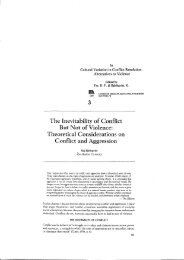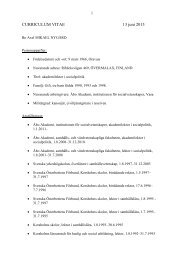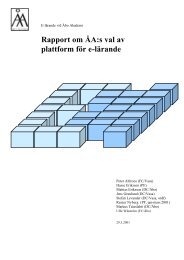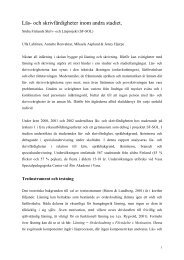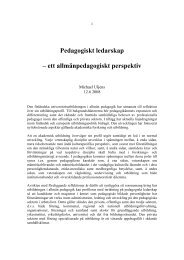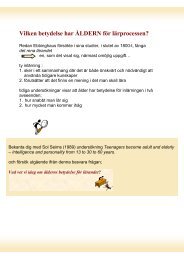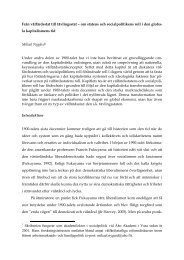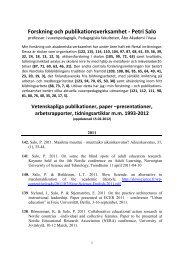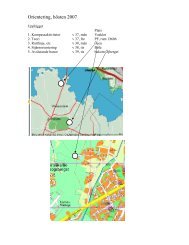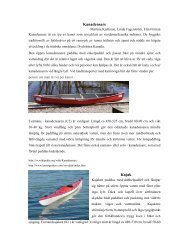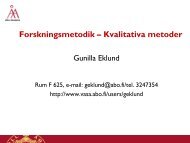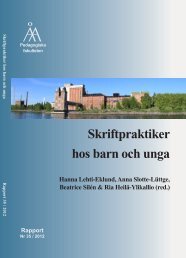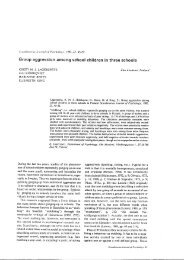Parties, Candidates and Citizens On-Line - Åbo Akademi
Parties, Candidates and Citizens On-Line - Åbo Akademi
Parties, Candidates and Citizens On-Line - Åbo Akademi
Create successful ePaper yourself
Turn your PDF publications into a flip-book with our unique Google optimized e-Paper software.
Introduction<br />
“A seeming beneficiary of internet-based campaigning would be the resourcepoor<br />
c<strong>and</strong>idate. Since, theoretically, access to all c<strong>and</strong>idates’ sites by the user is<br />
on an equal footing, <strong>and</strong> the cost for posting a home page is minimal, the<br />
internet would appear to have the potential of serving as an equalizing<br />
medium for all c<strong>and</strong>idates, both major <strong>and</strong> minor parties, both well known <strong>and</strong><br />
obscure” (Davis 1999: 89)<br />
Political communication experienced significant changes during the 20th century. Two<br />
noticeable changes for political parties <strong>and</strong> c<strong>and</strong>idates were the decline in voter<br />
partisanship (Dalton 2000) accompanied by increasing dependence on the media when<br />
communicating campaign messages to the public (Blumler & Gurevitch 1995). The<br />
traditional ties between voter <strong>and</strong> party have significantly eroded (Dalton 2000; Swanson<br />
& Mancini 1996b: 7-12). As a result, instead of simply mobilizing partisan voters, political<br />
parties <strong>and</strong> c<strong>and</strong>idates are required to ‘catch’ all segments of voters in order to secure<br />
electoral success (cf. Wattenberg 2000). The most efficient way to communicate a<br />
campaign message to the masses is through media, therefore resulting in a ‘key’ role for<br />
mass media in modern political communication (Swanson & Mancini 1996a: 251).<br />
In the modern media system (see Norris 2001a: 147-9) political actors find<br />
themselves in the h<strong>and</strong>s of reporters <strong>and</strong> editors who serve as filters between them <strong>and</strong><br />
the public (Blumler & Gurevitch 1995: 3). This editorial process usually follows<br />
commercialized media logic (Altheide & Snow 1991). This trend has been especially<br />
troublesome for certain political actors. Fringe parties <strong>and</strong> c<strong>and</strong>idates often fail to break<br />
the news threshold (Margolis et al. 2003) <strong>and</strong> lack financial resources to attain public<br />
awareness through other channels, for instance via paid TV-advertisements (Carlson<br />
2000: 19). It comes as no surprise, then, that the advent of the internet was looked upon<br />
with great enthusiasm by most political actors (Bimber & Davis 2003: 20). The internet is<br />
cheap, interactive, enables fast <strong>and</strong> large quantities of information <strong>and</strong> multimedia<br />
dissemination <strong>and</strong> provides political actors with a direct communication channel to the<br />
electorate (Bimber & Davis 2003). Consequently, as compared to traditional media,<br />
communicating via the internet could help the smaller parties to stay in stride with the<br />
major parties in the electoral arena (see discussion in Margolis et al. 2003: 58; Norris 2003:<br />
25). The major parties’ advantage in traditional media coverage <strong>and</strong> campaign budgets<br />
could, however, eventually give them the upper h<strong>and</strong> on the internet (cf. Margolis &<br />
Resnick 2000: 72-4).<br />
116



